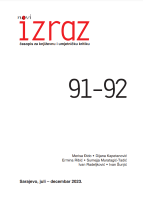Prolog kao privilegirano mjesto autorske individualizacije srednjovjekovne pjesnikinje Marie de France
Prologue as a Privileged Place of Authorial Individualization of the Medieval Female Poet Marie de France
Author(s): Dijana KapetanovićSubject(s): Gender Studies, Cultural history, French Literature, 6th to 12th Centuries, 13th to 14th Centuries, Theory of Literature, Sociology of Literature
Published by: P.E.N. Centar Bosne i Hercegovine
Keywords: Medieval Literature; Marie de France; Prologue, Les Lais; Feminist Reading;
Summary/Abstract: The paper explores the importance and role of female writers in the process of authorial self‑individualization in medieval French literature. In this sense, particular attention is paid to the analysis of one of the most famous medieval female authors, Marie de France, highly educated and therefore excelling not only in translating and adapting Latin and Middle English texts, but also in creating a new literary genre. Namely, at a time when education and knowledge are a monopoly exclusive to the male part of the population, Marie de France, with her erudition and poetic talent, is a representative of women’s writing in the context of medieval literary production. By exploiting the themes and motifs of Celtic folklore and mythology, Marie de France creates les lais, short stories in verse with lyrical elements, thereby introducing an unknown literary form onto the literary stage of the twelfth century. The paper further analyses the prologues of her work, as a privileged place where Marie de France expresses her awareness of the significance of literary writing project in the Old French idiom at the time of the dominance of the Latin language. In this regard, in the period of author’s anonymity and the privileging of tradition and collectivism, Marie de France leaves in her prologues and epilogues a documented testimony of self‑awareness and self‑individualization as the female author, and in which she positioned herself with respect to the tradition and male authors of her time. Ultimately, through the prism of feminist readings, her literary legacy clearly demonstrates a skilled subversive technique of undermining of feudal patriarchal society so that a woman’s voice could finally be heard and understood.
Journal: NOVI IZRAZ, časopis za književnu i umjetničku kritiku
- Issue Year: 2023
- Issue No: 91-92
- Page Range: 1-27
- Page Count: 25
- Language: Bosnian

